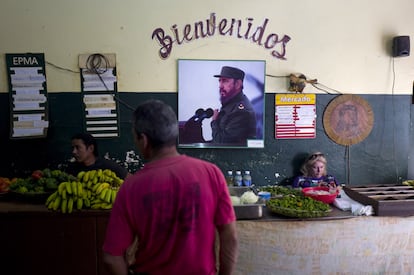Almost 90% of the Cuban population lives in ‘extreme poverty’ according to new study
The results revealed that 72% of those surveyed consider the food crisis the main problem, and that seven out of 10 Cubans have stopped eating breakfast, lunch, or dinner due to lack of money or shortages

In the sky of the El Vedado business district in Havana the Torre K Hotel stands out, a mass of cement that many Cubans ask why, and under what reasoning, it was built where it was. In 2018, the Gaviota hotel group, owned by the business and military conglomerate Gaesa, began to erect the 154-meter-high, 42-story construction, located in front of the Coppelia ice cream parlor, next to the Habana Libre hotel, a few blocks from the University of Havana and next to El Quijote Park. The controversial Torre K Hotel swept away any architectural rules, obstructed the views of residents, and has forced them to breathe cement for longer than agreed. A few days ago, a company announced on Facebook that it would not be long before the Torre K Hotel would finally “illuminate the nights of Vedado.” But the announcement of its early opening has ignited the debate that started the day they put the first foundation block in the ground: How to justify the continued construction of hotels in a country that is mired in poverty?
Some comments in response to the post highlight the obvious: “A hotel, with the misery in which Cubans live,” read one. Another said that the hotel was going to be a sort of “rechargeable lamp erected in the heart of Vedado,” which will illuminate the city night in the middle of a blackout. This is what worries Cubans: the construction of the hotel underlines the contrast of a life of shortages, which can be summarized in lack of food, constant power cuts, low salaries doubly minimized by inflation, and discontent with the government.
These shortages are also reflected in the seventh edition of a study called “The State of Social Rights in Cuba,” conducted by the Cuban Observatory of Human Rights (OCDH), an independent organization based in Madrid. The report states that in 2024, 89% of the Cuban population will live in conditions of “extreme poverty.” This comes at a time when the island is experiencing an economic crisis that, according to experts, is already more serious than that of the early 1990s. The study also revealed that 86% of Cuban households exist “on the margins of survival” and that, of these, 61% do not even have enough “to buy the essentials to survive.”
The OCDH conducted more than 1,000 interviews with people over 18 years of age in 78 municipalities in the country. “These data have helped us to question the misnamed ‘social pact’ through which Cubans gave up their civil and political rights in exchange for other rights such as labor, cultural, and social rights,” Alejandro González Raga, executive director of the Observatory, told EL PAÍS. Raga explained that the objective of this type of study is to provide transparency in the face of opacity, manipulation, or scarcity of public information. “Our biggest aspiration is that these data also contribute, so that the population is given an answer with effective measures, something that unfortunately doesn’t happen.”
The results revealed that 72% of those surveyed consider the food crisis the main problem, and that seven out of 10 Cubans have stopped eating breakfast, lunch, or dinner due to lack of money or food shortages. Only 15% were able to eat three meals a day on a regular basis. The age group most affected when it comes to putting food on the table is, according to the study, those aged over 70.
After food, the issues that most worry Cubans today are blackouts, followed by the cost of living — exacerbated by up to three-digit inflation rates that have been reported in the country — as well as low salaries, corruption, and the state of public health. It is precisely the lack of medicines, the deterioration of hospitals, and the lack of supplies that are the providing a major source of concern for citizens in a country that once called itself a “medical powerhouse.” The study notes that 38% of elderly participants were unable to obtain medicines, most of them because of the cost but others due to shortages.
In addition, the figures also confirm that those who are able to live more comfortably in Cuba receive remittances from overseas, which allow them to buy and access basic products in non-state sector stores. On the contrary, those who are “having a worse time” are those who do not receive remittances (61%) — in this case, the majority are black Cubans — followed by the unemployed (44%) and prisoners (26%).
91% of Cubans disapprove of “the government’s economic and social management”
“The increasing depreciation of the Cuban peso has hit the vast majority of households hard. And although family remittances have a considerable positive influence on the households that receive them (which represent only 24% of the population), shortages or increases in the price of basic products and services also limit these families,” the report states. Added to this panorama is the unemployment rate: 12% of participants said they are unemployed and 69% of them have been out of work for over a year.
The numbers only confirm the dissatisfaction with the government that Cubans have expressed as never before in several anti-system protests in recent years. Ninety-one percent disapprove of “the government’s economic and social management,” while only 4% rated it as “favorable.” On the other hand, 3% believe that the current Cuban model “should be the reference for future development.”
These levels of precariousness are not something that the government has been able to hide or disguise. At the beginning of the year, for the first time, Cuban authorities had to request “urgent” assistance from the World Food Program to provide milk for children aged under seven. At that time, Minister of Labor and Social Security Marta Elena Feitó Cabrera acknowledged that some 1,236 communities in the country live in poverty. Cuba has also assumed the top-ranking spots in the world’s poverty surveys. In 2023, the firm DatoWorld revealed that Cuba was the poorest country in Latin America, ahead of Venezuela and Honduras. In 2022, the island was given the “inglorious title of 2021′s most-miserable country” by the annual Hanke’s Misery Index.
In a country with an economy that has contracted by 2%, where precariousness levels are the order of the day, its citizens have responded by staging the largest exodus in its history over the past three years. According to recent estimates by Cuban anthropologist and economist Juan Carlos Albizu-Campos, the Cuban population has fallen by 18% and today only 8.62 million people live on the island. The rest have sought an escape from misery.
Sign up for our weekly newsletter to get more English-language news coverage from EL PAÍS USA Edition
Tu suscripción se está usando en otro dispositivo
¿Quieres añadir otro usuario a tu suscripción?
Si continúas leyendo en este dispositivo, no se podrá leer en el otro.
FlechaTu suscripción se está usando en otro dispositivo y solo puedes acceder a EL PAÍS desde un dispositivo a la vez.
Si quieres compartir tu cuenta, cambia tu suscripción a la modalidad Premium, así podrás añadir otro usuario. Cada uno accederá con su propia cuenta de email, lo que os permitirá personalizar vuestra experiencia en EL PAÍS.
¿Tienes una suscripción de empresa? Accede aquí para contratar más cuentas.
En el caso de no saber quién está usando tu cuenta, te recomendamos cambiar tu contraseña aquí.
Si decides continuar compartiendo tu cuenta, este mensaje se mostrará en tu dispositivo y en el de la otra persona que está usando tu cuenta de forma indefinida, afectando a tu experiencia de lectura. Puedes consultar aquí los términos y condiciones de la suscripción digital.









































